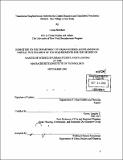| dc.contributor.advisor | Langley C. Keyes. | en_US |
| dc.contributor.author | Beckham, Leiasa, 1971- | en_US |
| dc.contributor.other | Massachusetts Institute of Technology. Dept. of Urban Studies and Planning. | en_US |
| dc.coverage.spatial | n-us-ma | en_US |
| dc.date.accessioned | 2011-06-20T15:50:40Z | |
| dc.date.available | 2011-06-20T15:50:40Z | |
| dc.date.copyright | 2002 | en_US |
| dc.date.issued | 2002 | en_US |
| dc.identifier.uri | http://hdl.handle.net/1721.1/64559 | |
| dc.description | Thesis (S.M.)--Massachusetts Institute of Technology, Dept. of Urban Studies and Planning, 2002. | en_US |
| dc.description | Includes bibliographical references (p. 49). | en_US |
| dc.description.abstract | "Transitional neighborhoods" had been traditionally viewed as areas that do not have much value to the urban fabric. Given that popular opinion, how have some of these neighborhoods survived the Central Business District expansion and Urban Renewal? Bay Village in Boston, Massachusetts is a prime example of a neighborhood that has withstood the development pressures of the downtown. In this thesis, I will examine how this neighborhood has survived and how the process of neighborhood preservation has conflicted and compromised with downtown interests. I will also examine how the neighborhood interests are viewed in today's development climate and what the affects have been on development processes and form. | en_US |
| dc.description.statementofresponsibility | by Leiasa Beckham. | en_US |
| dc.format.extent | 49 p. | en_US |
| dc.language.iso | eng | en_US |
| dc.publisher | Massachusetts Institute of Technology | en_US |
| dc.rights | M.I.T. theses are protected by
copyright. They may be viewed from this source for any purpose, but
reproduction or distribution in any format is prohibited without written
permission. See provided URL for inquiries about permission. | en_US |
| dc.rights.uri | http://dspace.mit.edu/handle/1721.1/7582 | en_US |
| dc.subject | Urban Studies and Planning. | en_US |
| dc.title | Transitional neighborhoods : between the central business and established residential districts : Bay Village, a case study | en_US |
| dc.type | Thesis | en_US |
| dc.description.degree | S.M. | en_US |
| dc.contributor.department | Massachusetts Institute of Technology. Department of Urban Studies and Planning | |
| dc.identifier.oclc | 51887580 | en_US |
